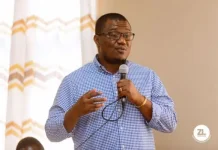Author: Peter Martey Agbeko, APR
The conflict in Bawku continues to spiral, marked by a disturbing escalation in violence. Reports of gunfire and the burning of homes have become all too common. Yet, in the face of this grim reality, the Upper East Regional Minister, Donatus Akamugri Atanga, has dismissed calls for a state of emergency, asserting that the situation does not warrant such a measure.
This stance, while possibly motivated by a desire to avoid panic or protect the image of the region, may be underestimating the urgency of the threat. What is unfolding in Bawku is not just an isolated disturbance—it is a simmering conflict that is beginning to boil over, with the potential to destabilise the entire area if not swiftly and strategically addressed.
Bawku is a community caught in the grip of deep-seated tensions. The government’s responsibility in such a moment is to prevent further deterioration and protect lives and property. While declaring a state of emergency may not be the only solution, dismissing it outright without offering credible alternatives sends the wrong signal to both perpetrators and victims.
What is needed now is a multi-layered and pragmatic approach to restore calm and rebuild trust. This includes:
Strengthened Security Presence
The government must reinforce the presence of security agencies in Bawku, not just for show, but with a clearly defined operational mandate. Joint police-military patrols should be deployed with instructions to act professionally, impartially, and decisively against armed elements threatening peace.
Intelligence-Driven Policing
A reactive security strategy will not suffice. The use of intelligence-led operations to identify and neutralize the sources of arms, funding, and command structures behind the violence is critical.
Tactical Curfews and Checkpoints
Instead of an all-encompassing state of emergency, localised curfews and strategic checkpoints can be introduced to restrict the movement of suspected perpetrators and limit the spread of violence.
Community Dialogue and Engagement
The voices of traditional authorities, youth leaders, religious figures, and civil society actors must be brought into the conversation. Building bridges within the community is essential for long-term peace.
Support for Victims and Displaced Persons
Beyond security, there must be visible humanitarian interventions. Homes have been destroyed. Families have been displaced. The state must show it cares by offering relief and resettlement support.
It is also encouraging to note that His Majesty Otumfuo Osei Tutu II, the Asantehene, is expected to step into the fray to help mediate. His wisdom, neutrality, and respected moral authority offer a unique opportunity to break the cycle of mistrust.
But even as we await his intervention, the state must act—and act now. Peace is not the absence of conflict, but the presence of justice and security. The people of Bawku deserve no less
AMA GHANA is not responsible for the reportage or opinions of contributors published on the website.









































